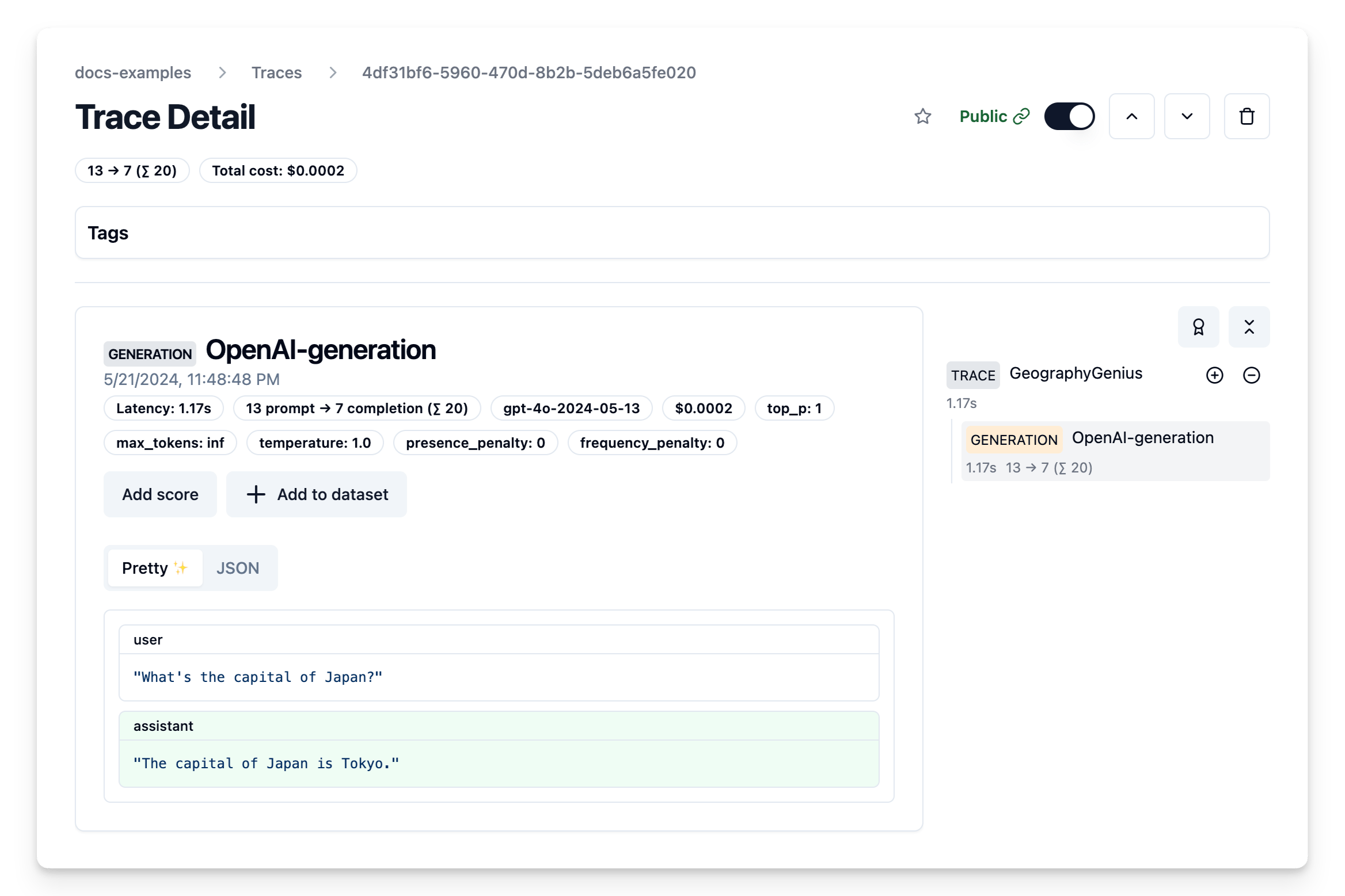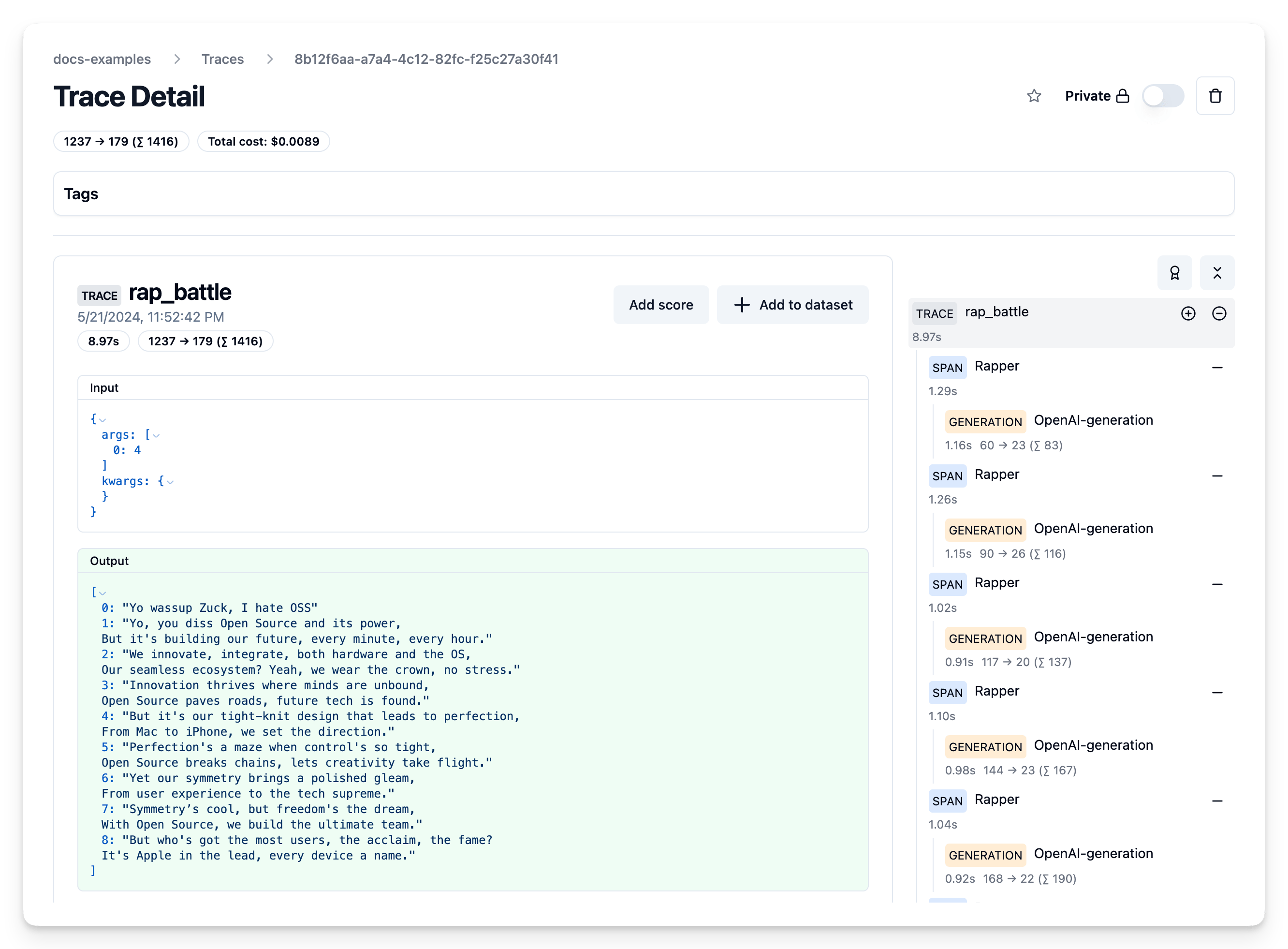Cookbook: Mirascope x Langfuse integration
Mirascope is a Python toolkit for building with LLMs. It allows devs to write Pythonic code while profiting from its abstractions to common LLM use cases and models.
Langfuse is an open source LLM engineering platform. Traces, evals, prompt management and metrics to debug and improve your LLM application.
With the Langfuse <-> Mirascope integration, you can log your application to Langfuse by adding the @with_langfuse decorator.
Let’s dive right in with some examples:
# Install Mirascope and Langfuse
%pip install mirascope[all] langfuseimport os
# Get keys for your project from the project settings page
# https://cloud.langfuse.com
os.environ["LANGFUSE_PUBLIC_KEY"] = ""
os.environ["LANGFUSE_SECRET_KEY"] = ""
os.environ["LANGFUSE_HOST"] = "https://cloud.langfuse.com" # 🇪🇺 EU region
# os.environ["LANGFUSE_HOST"] = "https://us.cloud.langfuse.com" # 🇺🇸 US region
# Your openai key
os.environ["OPENAI_API_KEY"] = ""Log a first simple call
from mirascope.langfuse import with_langfuse
from mirascope.openai import OpenAICall, OpenAICallParams
@with_langfuse
class GeographyGenius(OpenAICall):
prompt_template = "What's the capital of {country}?"
country: str
call_params = OpenAICallParams(model="gpt-4o", temperature=1)
genius = GeographyGenius(country="Japan")
response = genius.call() # logs to langfuse
print(response.content)
Let’s make this more complex
We’ll use
- Mirascope’s
@with_langfusedecorator to log the call to Langfuse within the Mirascope classes - and Langfuse default
@observedecorator which works with any Python function
to create and trace a fun rap battle and group everything into a single trace.
from openai.types.chat import ChatCompletionMessageParam
from mirascope.openai import OpenAICall
from langfuse.decorators import observe
@with_langfuse
class Rapper(OpenAICall):
prompt_template = """
SYSTEM: This is a rap battle. You are {person}. Make sure to defend you {position}. Only drop two lines at a time, make them rhyme.
MESSAGES: {history}
"""
history: list[ChatCompletionMessageParam] = []
person: str
position: str
zuck = Rapper(person="Mark Zuckerberg", position="Open source will win in VR/AR/Visual Computing", history=[])
timapple = Rapper(person="Tim Cook", position="Apple builds the best headsets as we are integrated in software and hardware", history=[])
# utility function to update the history of both rappers
def add_to_history(new_line: str, rapper: str):
zuck.history += [
{"role": "assistant" if rapper == "zuck" else "user", "content": new_line},
]
timapple.history += [
{"role": "assistant" if rapper == "timapple" else "user", "content": new_line},
]
## use the langfuse @observe decorator to log any Python function and wrap all logs within it into a single trace
@observe()
def rap_battle(lines: int):
# Make sure that the battle starts of juicy
add_to_history("Yo wassup Zuck, I hate OSS", "timapple")
for i in range(lines):
zuck_line = zuck.call()
print(f"(Zuck): {zuck_line.content}")
add_to_history(zuck_line.content, "zuck")
timapple_line = timapple.call()
print(f"(Tim Apple): {timapple_line.content}")
add_to_history(timapple_line.content, "timapple")
return [item["content"] for item in timapple.history]
rap_battle(4);Head over to the Langfuse Traces table in Langfuse Cloud to see the entire chat history, token counts, cost, model, latencies and more

That’s a wrap.
There’s a lot more you can do:
- Mirascope: Head over to their docs to learn more about what you can do with the framework.
- Langfuse: Have a look at Evals, Datasets, Prompt Management to start exploring all that Langfuse can do.